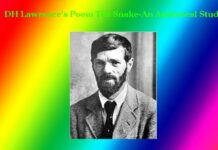Shakespeare’s Sonnet 65-Analytical Study
Shakespeare’s Sonnet 65-Analytical Study
Shakespeare’s Sonnet 65-Analytical Study
Shakespeare’s Sonnet 65 is a poignant exploration of the relentless march of time and its inevitable impact on the beauty and vitality of all things. In this sonnet, the poet grapples with the inexorable nature of time, reflecting on its ability to erode even the most enduring aspects of life.
The sonnet begins with a powerful assertion of the destructive force of time: “Since brass, nor stone, nor earth, nor boundless sea, / But sad mortality o’er-sways their power.” The use of “brass,” “stone,” “earth,” and the “boundless sea” symbolizes enduring and seemingly indestructible elements. However, the poet contends that even these formidable forces are subject to the sway of “sad mortality,” emphasizing the universal impact of time’s passage.
The second quatrain delves deeper into the consequences of time’s influence, highlighting its capacity to mar and decay the most exquisite creations: “How with this rage shall beauty hold a plea, / Whose action is no stronger than a flower?” The metaphorical use of “rage” portrays time as a forceful adversary, and the comparison of beauty to a fragile flower underscores the vulnerability of aesthetically pleasing things in the face of temporal progression.
The third quatrain intensifies the contemplation of time’s effects, focusing on the inevitable decay of human achievements and endeavors: “O! how shall summer’s honey breath hold out, / Against the wreckful siege of battering days?” The reference to “summer’s honey breath” symbolizes the fleeting and sweet nature of life’s prime moments. The phrase “wreckful siege of battering days” vividly conveys the relentless onslaught of time, suggesting that even the most vibrant and joyous periods are subject to erosion and decay.
The concluding couplet offers a glimmer of hope amidst the contemplation of transience. The poet introduces the concept of verse as a means of defying time’s corrosive influence: “But if thy verse do bridle thy invention,” suggesting that through the enduring power of poetry, one can transcend the limitations imposed by time. The act of capturing fleeting moments in verse becomes a form of resistance against the relentless march of mortality.
In summary, Shakespeare’s Sonnet 65 serves as a profound meditation on the universal and inescapable impact of time. Through powerful metaphors and vivid imagery, the poet explores the vulnerability of beauty, the transience of life’s pleasures, and the potential resilience found in the art of verse. This sonnet exemplifies Shakespeare’s ability to distill complex themes into a concise and evocative form, showcasing the enduring relevance of his insights into the human experience.
Shakespeare’s Sonnet 65-Analytical Study
You May Like:











